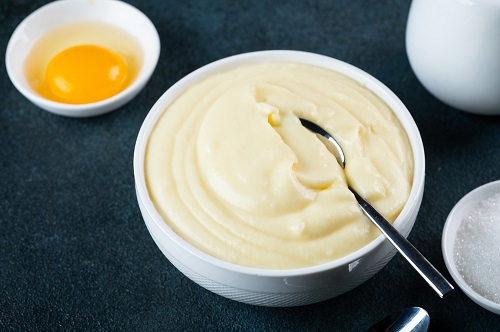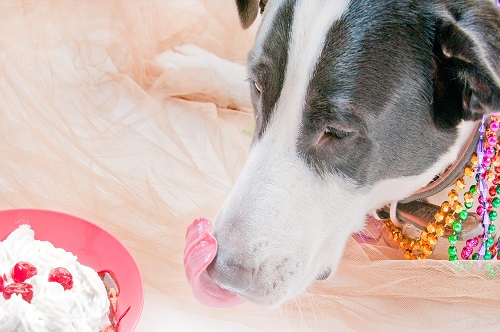Planning to surprise your furry friend with treats but wondering Can Dogs Eat Custard? Let’s find out together!
While custard is a happy treat for humans, and you may want to serve your canine with it, you got to learn—Can Dogs Eat Custard? Or is it just a sweet temptation that should be avoided? Let’s learn about it and explore some nutritious alternatives for your four-legged buddy!
What is Custard?

Custard is a rich and creamy dessert made from a combination of milk, eggs, sugar, and vanilla (or other flavorings). The mixture is typically cooked on the stovetop until it thickens and then chilled before serving.
It can be eaten as a standalone dish or used as a filling in cakes, tarts, and other desserts. There are also variations of custard, such as creme brulee and flan, which include different ingredients and preparation methods.
While the classic recipe is simple, custard’s versatility has led to a variety of flavors and adaptations, including those made with plant-based milk alternatives, like almond or soy milk, for those with dietary restrictions.
Learn if Oat Milk is Safe for Dogs here
Is Custard Bad for Dogs?
Custard is not necessarily bad for dogs, but ensure not to feed your canines with custard on a regular basis. The primary ingredients of this dessert—milk and sugar have high fat and sugar content, which is not suitable for dogs.
According to an experiment cited in the Italian Journal of Animal Science, 6 out of 12 dogs were reportedly intolerant to lactose supplements, whereas 8 of them did not exhibit any palatability problems and remained healthy throughout the supplementation periods. Your pet might be lactose intolerant, so including custard in its diet will lead to gastrointestinal issues.
Always refer to your canine’s health profile before introducing a new ingredient to its diet.
Can Dogs Eat Custard?
So the question remains—Can Dogs Eat Custard? Well, technically, YES.
Dogs can have custard, but you must remember they can enjoy it in moderation as long as it is made with dog-friendly ingredients and served in small, controlled portions. While custard itself is not toxic to dogs, you must be careful with a few adjustments to the recipe, such as using lactose-free milk or a milk substitute and replacing sugar with a natural, dog-safe sweetener like xylitol-free stevia or monk fruit to create a dog-friendly version of custard.
Additionally, incorporating healthy additives like pureed pumpkin or unsweetened apple sauce will not only enhance the flavor but also provide beneficial nutrients to your furry friend. Remember, moderation is key, and always ensure to consult with your veterinarian before introducing any new food items to your dog’s diet.
Check out Can Dogs Eat Biscuits here
Does it Offer Some Health Benefits to Dogs?

While custard isn’t very suitable for your dogs, there are some potential health benefits if the custard is modified to their needs. Here are certain health benefits of dog-friendly custard:
- Protein Source: Eggs are an excellent source of protein for dogs that is crucial for muscle growth, tissue repair, and overall health. Apart from that, eggs are rich in linoleic acid, Vitamin B2, and B12, and water-soluble Vitamin A, all of which improve the dog’s skin and coat.
- Nutrient-Dense: Custard can be a source of essential vitamins and minerals, such as calcium, phosphorus, and vitamin A, which are important for maintaining healthy bones, teeth, and eyesight.
- Digestive Health: By substituting milk with lactose-free milk or a dog-friendly alternative like goat’s milk, custard can support a dog’s digestive system.
Check out Can Dogs Eat Eggs here
A Few Health Concerns
The traditional custard recipes include ingredients that are high in fat and sugar content, leading to potential health hazards in dogs.
- Obesity: If prepared with cow milk and sugar, the custard will lead to weight gain and obesity in dogs. Obesity can lead to various health problems, such as joint issues, heart disease, and diabetes.
- Digestive Issues: Some dogs are lactose intolerant, which may lead to gastrointestinal issues.
- Dental Issues: The sugar in custard can lead to dental problems in dogs, such as tooth decay and gum disease.
- Nutritional Imbalance: Feeding too much custard to dogs can lead to an imbalanced diet, as it does not provide all the necessary nutrients that dogs need.
- Allergies: Dogs can be allergic to some of the ingredients in custard, such as eggs or vanilla, causing allergic reactions, such as itching, skin irritation, and gastrointestinal issues.
How to Make Dog-Friendly Custard at Home?
To make dog-friendly custard at home, you can follow this simple recipe using ingredients that are safe for your canine companion.
Ingredients:
- 2 cups lactose-free milk or goat’s milk
- 3 egg yolks
- 1/4 cup cornstarch
- 1/4 cup water
- Pumpkin puree or unsweetened applesauce for an added flavor
Instructions:
- In a medium-sized saucepan, heat the milk over low heat until it’s warm but not boiling.
- Whisk the egg yolks until they become slightly frothy in a separate bowl.
- In another small bowl, mix the cornstarch with the water until it forms a smooth paste.
- Slowly pour the cornstarch mixture into the egg yolks while whisking continuously. This will ensure a smooth, lump-free texture.
- Gradually pour the egg yolk and cornstarch mixture into the warm milk, stirring constantly to prevent lumps.
- Continue to cook the mixture over low heat, stirring constantly until the custard thickens. This may take around 10-15 minutes. Be patient and avoid turning up the heat, as this could cause the custard to curdle.
- Once the custard reaches your desired consistency, remove it from the heat and stir in the puree or apple sauce.
Note: Remember, this should be considered a treat and not a meal replacement.
Check out Can Dogs Eat Peanut Butter? here
Can Dogs Eat Frozen Custard or Ice Cream?

Dogs should generally avoid consuming frozen custard or ice cream due to a few potential health concerns. These frozen treats often contain lactose and high sugar content that can contribute to obesity, dental problems, and diabetes in dogs.
Consuming excessive sugar can cause spikes in blood sugar levels, which over time, can lead to insulin resistance and other health complications. Additionally, certain additives and flavorings in frozen custard or ice cream, such as chocolate or artificial sweeteners like xylitol, are toxic to dogs and can cause severe health issues or even be fatal.
Instead of offering frozen custard or ice cream, consider providing your dog with a safer, dog-friendly homemade frozen treat by blending dog-safe ingredients like lactose-free milk or yogurt, mashed bananas, or unsweetened peanut butter, and then freezing the mixture in ice cube trays or silicone molds.
These dog-friendly frozen treats can provide similar enjoyment without the risks associated with traditional frozen custard or ice cream.
Check out Can Dogs Eat Sour Cream here
Canine-Friendly Alternatives to Custard
There are several canine-friendly alternatives to custard that you can offer your dog as a treat:
- Plain Yogurt: Plain yogurt is a good source of protein and calcium and can be a healthy treat for dogs.
- Fresh Fruits: Many dogs enjoy fresh fruits like apples, bananas, and berries. Fruits are a good source of vitamins and fiber and make a healthy treat option for dogs.
- Unsalted Peanut Butter: Unsalted peanut butter is a popular treat option for dogs, as it’s high in protein and healthy fats.
- Carrots: Carrots are a low-calorie, crunchy snack that many dogs enjoy. They’re also a good source of vitamins and fiber.
- Homemade Frozen Treats: You can freeze plain yogurt or blend up some fresh fruit and freeze it in ice cube trays for a cool, refreshing treat that dogs will love.
Check out Can Dogs Eat Sapodilla here
Quick Takeaway
So, Can Dogs Eat Custard? Your canine friend can certainly enjoy custard in moderation if it is prepared with dog-friendly ingredients. However, always ensure to consult a veterinarian before introducing any new ingredient to their diet.
